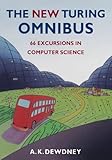A. K. Dewdney
Alexander Keewatin Dewdney (born August 5, 1941 in London, Ontario) is a Canadian mathematician, computer scientist and author who has written a number of books on mathematics, computing, and bad science. He has also written two novels, The Planiverse (about an imaginary two-dimensional world) and Hungry Hollow : The Story of a Natural Place. Dewdney lives in London, Ontario, Canada where he holds the position of Professor Emeritus at the University of Western Ontario. Dewdney is the son of Canadian artist and author Selwyn Dewdney, and brother of poet Christopher Dewdney.
In his student days, Dewdney made a number of influential experimental films, including "Malanga", on the poet Gerald Malanga, "Four Girls", "Scissors", and his most ambitious film, the pre-structural "Maltese Cross Movement".[citation needed]
Dewdney followed Martin Gardner and Douglas Hofstadter in authoring Scientific American magazine's recreational mathematics column, renamed to "Computer Recreations", then "Mathematical Recreations", from 1984 to 1991. These have been collected into three books of mathematical recreations. Dewdney was a co-inventor of programming game Core War.
In 2003, Dewdney conducted three aerial experiments on cellphone communication, in attempts to prove that cellphones will not function on passenger aircraft when in flight. The last experiment was filmed and broadcast by Japan's TV Asahi.
For the last 20 years, Dewdney has concentrated on biology, both as a field ecologist and as a mathematical biologist, contributing a solution to the thorny problem of determining the underlying dynamics of species abundance in natural communities. Continue Reading »
The above description is from the Wikipedia article on
A. K. Dewdney, licensed under
CC-BY-SA 3.0. A full list of contributors can be found
here.
